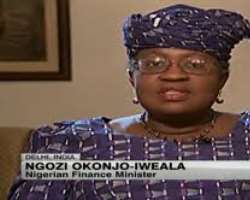Okonjo-Iweala: FG released N130b to the military in three months

The Minister of Finance Coordinating Minister for the Economy and Minister of Finance, Dr Ngozi Okonjo-Iweala, has dissed claims by the military's plea of poor funding as reason behind its struggle in the fight against the Boko Haram insurgency.
The minister said that the Federal Government had adequately provided for the funding needs of the military men in the fight against the insurgency.
According to her, the military has received N130.7 billion from the Federal Government between January and April, 2014 while another N3.8 billion has been approved by President Goodluck Jonathan but is still being processed and will be released to the military soon.
Okonjo-Iweala was briefing journalists on the breakdown of the N4.964 trillion 2014 budget signed by the President on Wednesday but handed over to her in Abuja on Friday.
'Defence spending is top in everything. You know that military establishments need new things to assist them in their work, and ours will not be different. No budget will be enough to meet their demands but for now, I think the sector takes almost a trillion of the budget.'
She stated that defence budget in 2014 is 'about N968.127 billion and we have disbursed N130.7 billion between January and April 2014, N85.9billion out of what has been disbursed is for personnel cost.
Oknojo-Iweala said the military is in charge of its personnel salaries 'because they are yet to be integrated into the IPPIS.
On the late passage and signing of the 2014 budget, the finance minister said the delay would not affect the running of the economy as the existing laws give the executive power to spend up to 50 per cent of the annual budget pending its passage and signing.
'That is exactly what we have done and we have disbursed N200 billion for the first quarter of the 2014, based on what the law allows us to do,' he said.
'So the effect of the delay may be relatively minimal.'
She added that N571 billion would be borrowed to bridge the gap (fiscal deficit), adding that the one per cent deficit gap, when analysed within the context of the Fiscal Responsibilty Act (FRA) provisions, which allowed for three per cent, and global best practices is reasonable.
The finance minister further disclosed that 'from June 2014, the Federal Government will advertise for the people that will benefit in the initial 10,000 housing scheme, to give the young ones hope to live.'
Sshe added that agriculture, aviation and solid mineral sectors would get support in the form of duties to buy equipment to support the sectors. The duties, she said, would be incentives at zero per cent.
toMeanwhile, the minister has said that Nigeria's budget deficit is now 1 percent of GDP following a rebasing of its gross domestic product. It was 1.9 percent before the rebasing.
The minister stated this Sin a statement, after President Goodluck Jonathan signed the budget for 2014 into law.
Nigeria recalculated its GDP last month, which pushed it ahead of South Africa to become Africa's top economy. The new figure shrank Nigeria's debt-to-GDP ratio to 11 percent for 2013, against 19 percent in 2012.
Its economy is attracting growing interest from foreign investors, although they worry about the government's tendency to squander its oil cash as well as mounting security challenges like a deadly Islamist insurgency that has killed thousands in the northeast and which hit the capital Abuja twice last month.
Most governments overhaul GDP calculations every few years to reflect changes in output, but Nigeria had not done so since 1990, so sectors such as e-commerce, mobile phones and its prolific 'Nollywood' film industry had to be factored in.
The budget assumes a $77.5 a barrel and production of 2.388 million barrels a day. The price assumption is seen as conservative, whereas the output assumption is seen as over optimistic, economists say.
